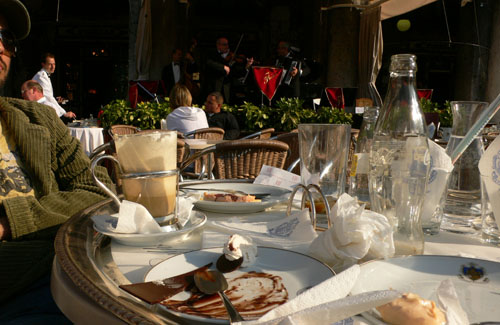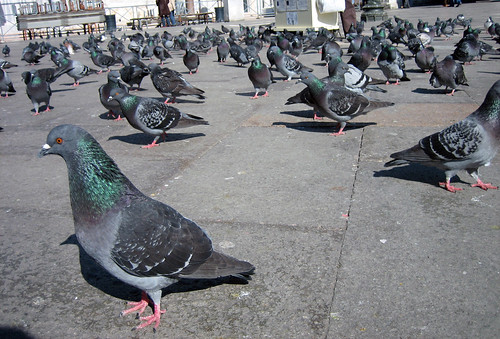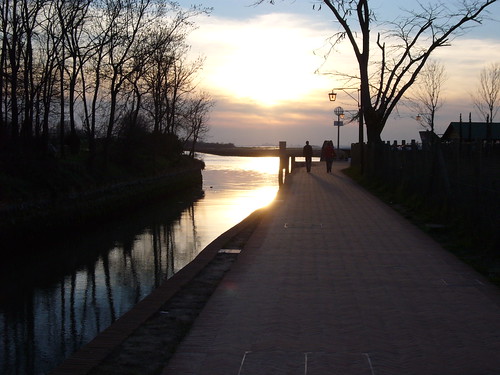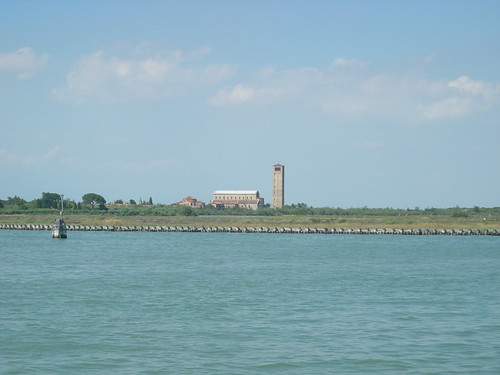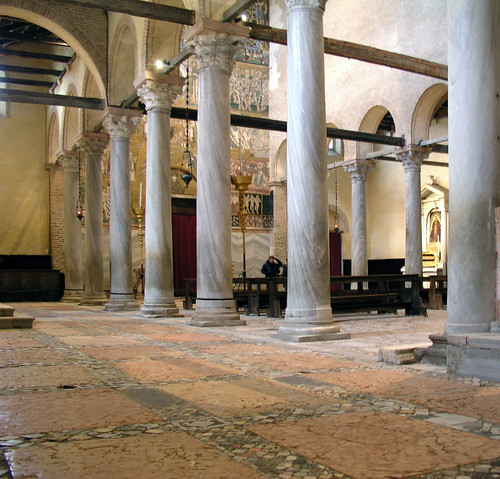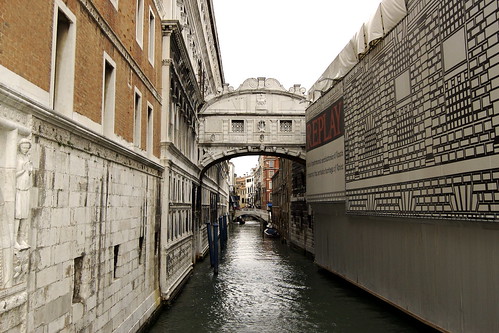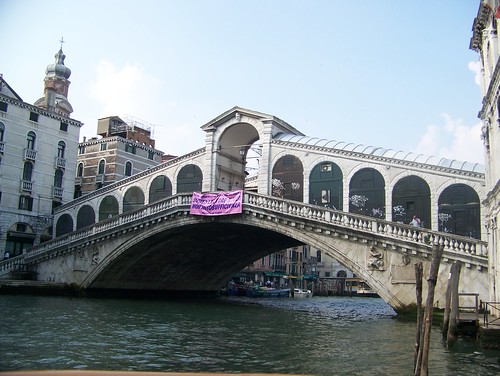"The shafts must therefore be, without exception, of one block in buildings of this kind (me--basically large ones); for the attempt in any place to incrust or joint them would be a deception...and would put an end at once to the spectator's confidence in the expression of wealth in any portion of the structure, or of the spirit of sacrifice in those whose raised it."
This sentiment could be properly applied at some level to all great enterprises. At least I thought so at one time. It may appear that I am having a difficult time writing of late. This is not quite the case. I am trying to suppress most of what comes out however; it is not edifying.
There is much talk of symmetry, or rather the notable absence of it, in the types of physically strong, high-spirited architecture Ruskin preferred: "...we must expect to see shafts introduced of size and proportion continually varying, and...dependent for its charm frequently in strange complexities and unexpected rising and falling of weight and accent in its marble syllables: bearing the same relation to a rigidly chiselled and proportioned architecture that the wild lyric rhythm of Aeschylus or Pindar bears to the finished measures of Pope." The comparison of the great manly Greeks to the rather more diminished specimen that was Pope (though I still like Pope quite a lot as a writer) was an excellent touch.
I was thinking last week about enlisting in the Army, which is a recurring idea I get about twice a year, though obviously it becomes a less viable option every day that passes. Also I am not wholly confident that they would be able to fulfill what would be my main motivations in going to them, which would be to make myself a more suitable person for functioning in this society, to develop a character that others would find acceptable, and that many claim to have themselves attained as a result of military service, and to discover something I might be competent at which would identify me at least to a few people as a man of above-average capabilities, though this last may be pushing it. A few years back I went to a career counselor, to whom I paid a considerable sum and underwent a battery of questioning and personality assessments. I cannot find the report that was made from the results; my wife appears to have done something with these papers. By the end of the sessions however it was evident even to me that I was likely not going to excel in professional life. I would not be able to manage/lead a group of people, I would never make big money, my female co-workers were never going to fall hopelessly in love with me, unless of course I would be able to change behavioral habits and attitudes of long duration; indeed, why wouldn't I? That is the elsuive question. My top ten list of suitable jobs, according to this assessment, included things like librarian. I can't remember the rest. I think college professor was #6. Writer may actually have been on the list too, and while flattering to my ego, it is a rather vague category for someone looking for somewhat more precise advice as to how he might go about getting on in the world. The thing is after all that expense, I never really even looked at the reports and how they were arrived at. I felt like I might as well have gone to a fortune teller--none of the information seemed to mean very much in reality, except to cast my major problems, namely a terrible work ethic and a disagreeable personality, into harsher relief. Joining the Army at this point would obviously be ridiculous, given my age, my physical and psychological state, and the seriousness of military life, for which I would appear to be most unsuited. Then again they don't seem to pay too much either. And then Sabrina my wife claims she would divorce me if I ever really did it. I know real men are unmoved by the threats of women if it interferes with their fulfillment of a manly function; but I think it is acceptable to acknowledge them. Obviously I am not going to do it, so why even think or write about it? Because something has to be done, and little else plausible presents itself.
"...ignorance is liable to be deceived, and has no right to accuse anything but itself as the source of the deception." We are back to Ruskin now. A fitting quote in response to that last bit I wrote.
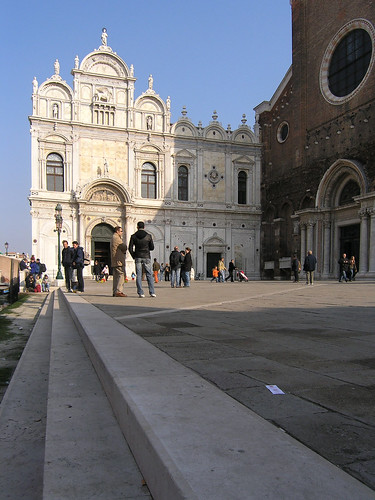 "...the truth reveals itself in proportion to our patience and knowledge, discovers itself kindly to our pleading, and leads us, as it is discovered, into deeper truths." The use of the word kindly is the striking thing here; we are accustomed, it seems to me, to speak and conceive of truth as something harsh, which is going to crush most of our little psyches when we have the misfortune to be caught up by it; perhaps this is how most people, being too ignorant or foolish to understand it for what it really is, experience it though. The kindly revelation would require, it seems to me, a particularly fine and well-developed mind to find a proper reception.
"...the truth reveals itself in proportion to our patience and knowledge, discovers itself kindly to our pleading, and leads us, as it is discovered, into deeper truths." The use of the word kindly is the striking thing here; we are accustomed, it seems to me, to speak and conceive of truth as something harsh, which is going to crush most of our little psyches when we have the misfortune to be caught up by it; perhaps this is how most people, being too ignorant or foolish to understand it for what it really is, experience it though. The kindly revelation would require, it seems to me, a particularly fine and well-developed mind to find a proper reception.There is a very useful explanation, both practical and ideological, of the method of incrustation. I liked it. I liked what it revealed about the possibilities of the human imagination.
"Wherever sculpture can be solid, the nobler characters of the human form at once lead the artist to aim at its representation, rather than at that of inferior organisms; but when all is to be reduced to outline, the forms of flowers and lower animals are always more intelligible, and are felt to approach much more to a satisfactory rendering of the objects intended, than the outlines of the human body."
"...there has never been a true or fine school of art in which colour was despised...I know it to be one of the first signs of death in the Renaissance schools, that they despised colour." Did they?
 "...there is not, as far as I am aware, in Europe, any monument of a truly noble school which has not been either painted all over, or vigorously touched with paint, mosaic and gilding in its prominent parts."
"...there is not, as far as I am aware, in Europe, any monument of a truly noble school which has not been either painted all over, or vigorously touched with paint, mosaic and gilding in its prominent parts."
"Every motive thus concurred in urging him (i.e., the Venetian) to the study of chromatic decoration, and every advantage was given him in the pursuit of it...the whole edifice (St. Mark's) is to be regarded less as a temple wherein to pray, than as itself a Book of Common Prayer, a vast illuminated missal, bound with alabaster instead of parchment, studded with porphyry pillars instead of jewels, and written within and without in letters of enamel and gold."
"But exactly in proportion to the nobility of any work, is the difficulty of conveying a just impression of it..." That is certainly the case with most of this blog.

